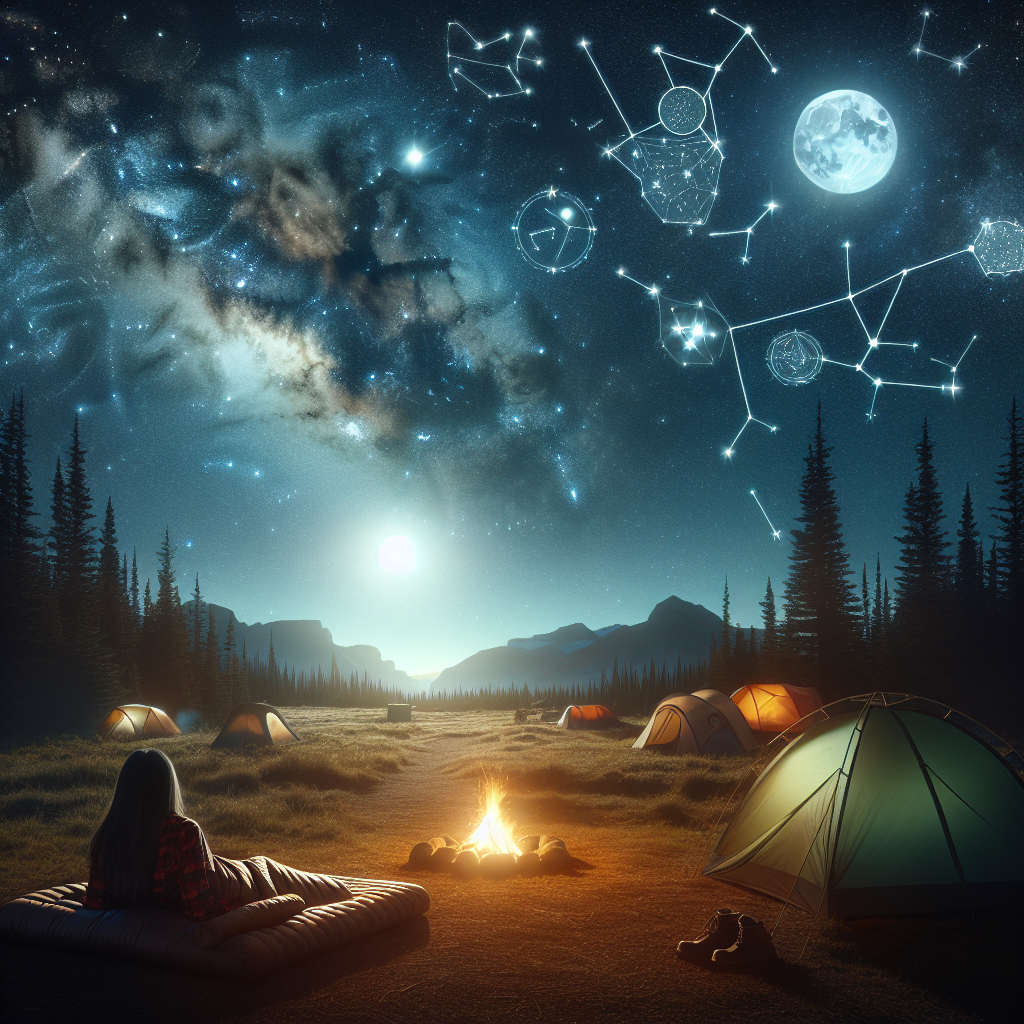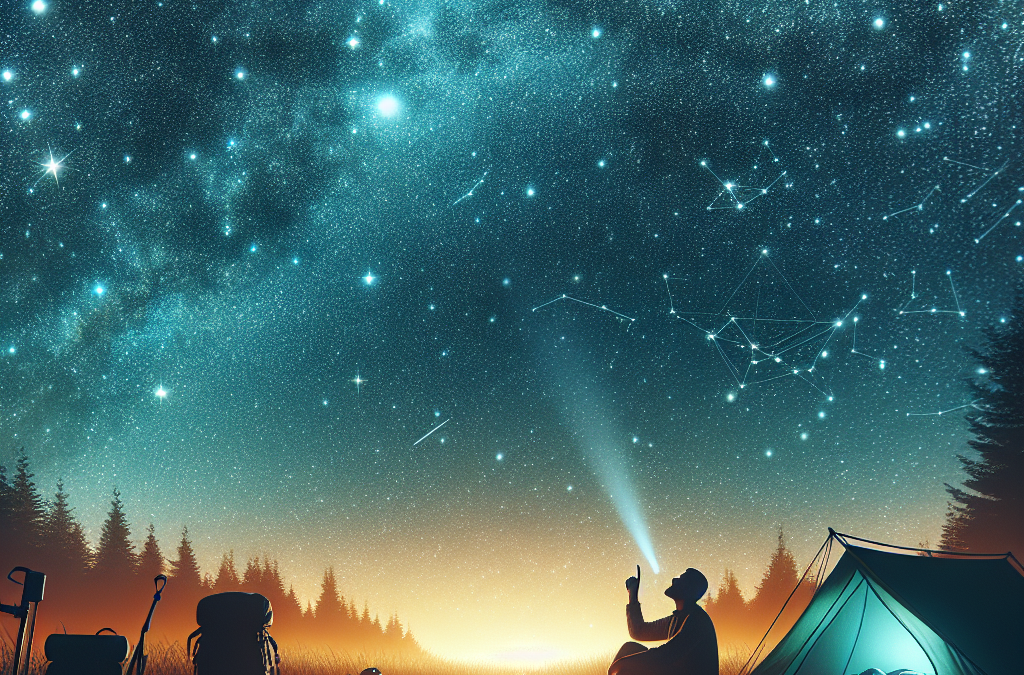Imagine yourself nestled amidst the tranquility of a pure, dark night, the crisp air ripe with the enchanting aroma of pine and damp earth lingering from a recent rain. Your comforting campfire casts a soft glow against the sable cloak of the night, and above, countless stars twinkle like scattered diamonds over the velvety, infinite expanse of the sky. If this sounds stirring to your adventurer spirit, then you are in the right place. In this article, you will uncover the secrets of experiencing the mystical waltz of celestial bodies as you lay snug in your camping tent. This is TrailTrekTribe’s Camper’s Guide to Star Gazing, designed to engage your love for the outdoors and the sky above in full synergy, inspiring awe and reverence for nature’s grand nighttime spectacle.
Understanding the Basics of Star Gazing
Star gazing can be a truly magical experience. Before you venture into this thrilling activity, it’s essential to ground yourself in the fundamentals.
The importance of patience in star gazing
Night sky observation requires perseverance and patience. Many celestial events don’t happen on-demand; they’re a gift of nature. Your eyes also need time to adjust to reduced light conditions. Patience, it’s often noted, is the heart of an enchanting stargazing experience.
Key Elements for a Successful Stargazing Experience
Several elements contribute to a successful stargazing experience. Clear and dark skies, proper equipment, and knowledge of celestial bodies can significantly influence your experience. It’s also suggested that you familiarize yourself with the weather forecast and moon phases.
Resources for Enhancing Your Star Gazing Knowledge
Numerous resources, such as guide books, online courses, and apps, can further enrich your knowledge of the cosmos. Astronomy clubs and local planetariums are also excellent sources of information and networking spots for amateur astronomers.
The Right Equipment for Star Gazing
The proper equipment can be a game-changer in stargazing. Let’s talk about some essential tools and their importance.
Binoculars versus Telescope: A Comparison
Binoculars are an excellent choice for beginners due to their portability and ease of use. However, if you wish to delve deeper—and see farther—into the cosmos, a telescope is worth investing in. Despite being expensive and slightly cumbersome, their power and clarity are unmatched.
Introduction to Types of Telescopes
Telescopes come in various types, each having its unique features. Refraction telescopes, for example, use glass lenses to gather light, while reflection telescopes utilize mirrors. Then, there are compound telescopes that utilize both.
Essential Star Gazing Equipment and Tools
In addition to a telescope or binoculars, consider acquiring a star map or astronomy app, a comfortable chair, and a note pad for journaling your experiences. You might also pack a red flashlight, which won’t interfere with your night vision.

Using a Star Map
Star maps can be an invaluable tool for star gazers. Learning to use one can significantly enhance your experience.
Understanding the Layout of a Star Map
Star maps display a representation of the night sky. They are designed according to the observer’s latitude and the time and date of observation. Key features include coordinates, constellation names, and celestial bodies.
Navigating the Night Sky with a Star Map
Navigating the night sky with a star map requires practice. Start by orienting the map to the current date and time. Then, match the edges of the map to the actual cardinal directions.
Digital Apps for Star Gazing
Nowadays, several stargazing applications generate a real-time, augmented reality overlay of the night sky. They offer a more interactive and user-friendly approach to learning about the cosmos and can be beneficial for beginners.
Learning about Constellations
Understanding constellations is a significant aspect of stargazing. They not only help us navigate the night sky but are also rich in history and mythology.
Identifying Major Constellations
Each hemisphere has prominent constellations. Recognizing these star patterns and their relationship to each other helps you identify other celestial bodies.
Understanding the Mythology and History of Constellations
Many constellations have myths and legends associated with them, hailing from different cultures and eras. Understanding these stories adds a rich layer of fascination to the night sky.
Using Constellations as a Guide to Other Celestial Bodies
By learning major constellations, you can use them as a roadmap to find other celestial wonders, like galaxies and nebulae. This skill makes stargazing more exhilarating.

The Best Time and Conditions for Star Gazing
The quality of your stargazing experience can greatly depend on several factors, including time, weather, and moon phases.
Preferred Camping Seasons for Star Gazing
Summer and winter are often the best seasons for stargazing. Winter nights are longer, offering more time to observe, while summer presents the beauty of the Milky Way.
Understanding Moon Phases and Their Effects on Star Gazing
Moon phases significantly impact stargazing. During full moon, its brightly lit surface can outshine faint stars. Therefore, moonless nights are ideal for observing the dimmer celestial bodies.
The Effect of Weather and Location on Visibility
Weather conditions and location have a crucial role in star gazing. Clear, dark skies away from city lights offer the best views.
How to Choose Star Gazing Campsites
The location of your star gazing campsite can dramatically affect what you see in the night sky. Here’s how to choose the right spot.
The Importance of Light Pollution in Selecting a Site
Light pollution is the enemy of star gazers. It results from excessive or misdirected artificial light, which obscures the night sky. As such, sites far from city lights are the best for star gazing.
Finding a Strategic Site in Your Camp Ground
Choose an open space with a wide view of the sky, unhindered by trees or structures. Also, consider having a shelter nearby for quick retreats in case of sudden weather changes.
Recommended Star Gazing Campsites
There are plenty of notable star gazing campsites around the world. These include Cherry Springs State Park in the USA, Atacama Desert in Chile, and Aoraki Mackenzie in New Zealand.
Understanding Celestial Events
Stargazing doesn’t only involve looking at stars. There are other fascinating celestial phenomena to consider as well.
Meteor Showers and How to Watch Them
Meteor showers are spectacular celestial events. Watching these requires no special equipment, but picking a dark site and a meteor shower peak timeframe increases your chances of catching the shower.
Understanding Solar and Lunar Eclipses
Eclipses—both solar and lunar—are mesmerizing celestial events. They occur when the Earth, Moon, and Sun align. Always remember to use protective eyewear when observing solar eclipses.
Comets, Asteroids and Other Celestial Events to Watch Out For
In addition to meteor showers and eclipses, other events like the passing of comets or close flyby of asteroids are worth noting. The rare conjunction of planets is another fascinating phenomenon for star gazers.
Stargazing Safety Tips
outdoor safety is a priority, even when stargazing. Here are some pointers to keep you safe.
Outdoor Safety While Star Gazing
Never wander alone at night in unfamiliar places. Always have a fully charged phone, and preferably, a companion or group. keep a safe distance from wildlife and avoid negative environmental impact.
Using Your Equipment Safely
Avoid leaving your equipment unattended where someone might trip over it. If using a telescope, never try to view the sun directly as it can lead to serious eye injury.
General Tips for a Safe Star Gazing Experience
Ensure you are dressed appropriately for the weather and have sufficient supplies of water and food. Also, remember to inform someone about your plans, especially if you are traveling to a remote area.
Preserving our Night Skies
As admirers of the night sky, it’s our responsibility to protect it for future generations. Let’s delve into how you can contribute.
The Effects of Light Pollution
Light pollution not only hampers our view of the night sky but also disrupts wildlife and wastes energy. It’s important to raise awareness about these adverse effects.
Promoting Responsible Star Gazing
By practicing responsible stargazing—like minimizing the use of lights, staying on paths, and maintaining a respectful noise level—you can help combat light pollution.
Participating in Initiatives for the Protection of Our Night Skies
Joining a local or global initiative can lend weight to the cause of protecting our night skies. Many organizations work to raise awareness and advocate for public policies to reduce light pollution.
Getting Your Kids Involved in Star Gazing
introducing kids to the wonders of the night sky can be an enriching experience. It’s a fun, educational activity that the whole family can enjoy.
Making Star Gazing Fun for Kids
Make stargazing fun by turning it into a game or storytelling session. You can also host a backyard stargazing night with simple snacks and cozy blankets.
Educational Aspects of Star Gazing for Kids
Stargazing is a fantastic way to teach children about space, science, and the universe. It helps develop their curiosity, imagination, and respect for nature.
Family-friendly Star Gazing Activities
Consider organizing a family stargazing outing, a visit to a local planetarium, or a space-themed movie night. Such activities can create memorable bonding moments and foster a love for astronomy among children.
In closing, stargazing is an accessible, enchanting, and educational hobby. It offers a unique opportunity to connect with our universe and ignite our sense of wonder. When approached with respect for nature and concern for safety, star gazing becomes not merely a pastime, but also a lifelong passion. So, carry this guide with you, look up, and lose yourself in the depths of the cosmos. The universe is waiting to be discovered. Your adventure begins now!

